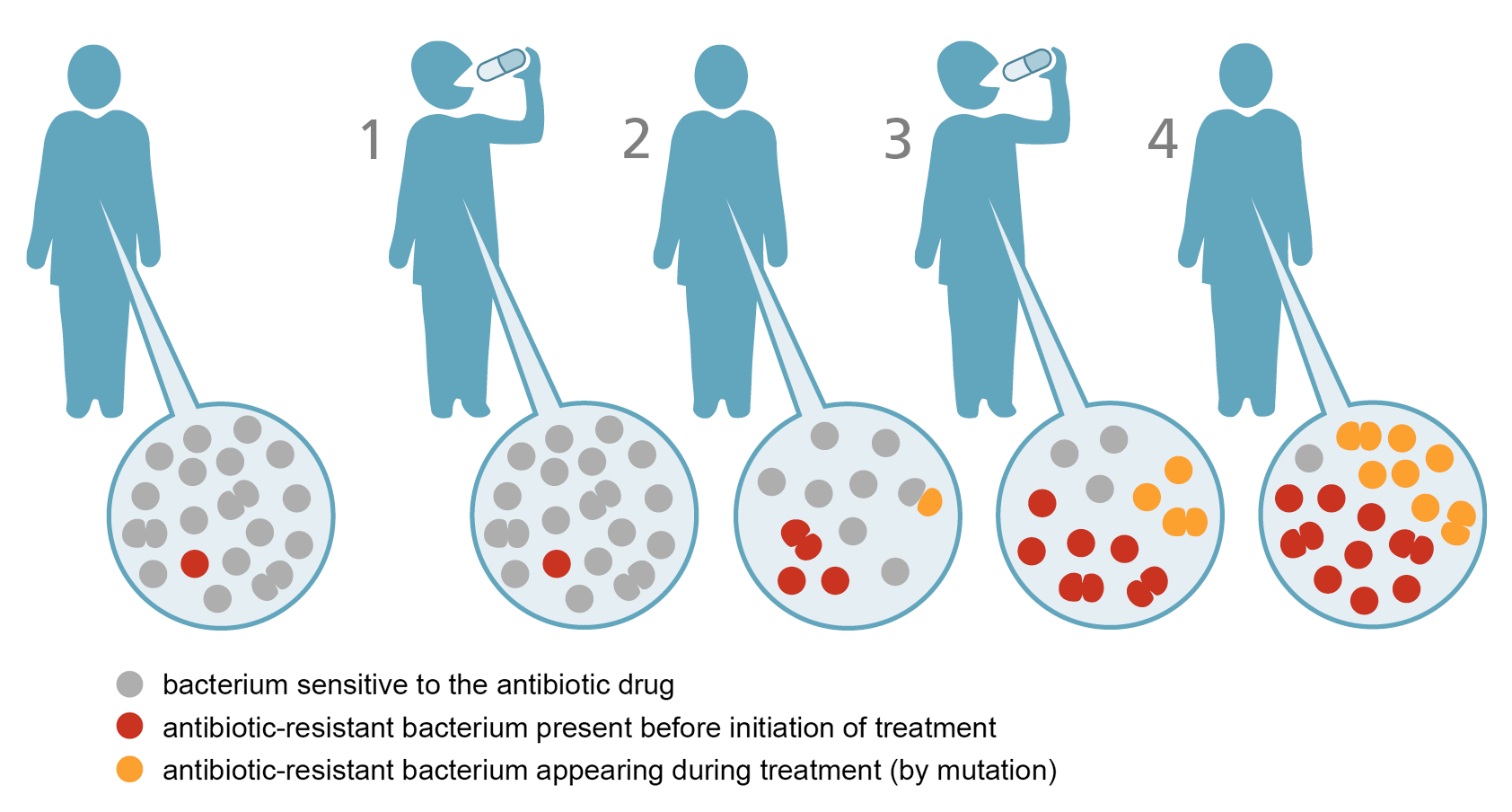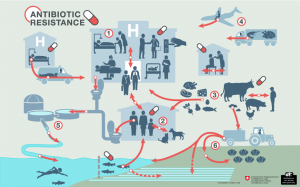Information for Laypersons
Antibiotic resistance is a worrying phenomenon, because antibiotics are essential to fight against – or to prevent – many infections induced by bacteria. Antibiotics are a mainstay of modern medicine:
- They can treat bacterial infections (pneumonia, septicaemia, etc.)
- They make surgery and organ transplants considerably safer.
- They protect cancer patients undergoing chemotherapy, as well as patients on immunosuppressant drugs due to an auto-immune condition such as rheumatoid arthritis, Crohn’s disease, etc.
Antibiotic resistance makes bacterial infections longer – and sometimes impossible – to treat. It can be the cause for deaths, prolonged hospital stays, and increased costs for the health system. Globally, more and more bacteria are becoming resistant to the action of certain antibiotics. In Switzerland ANRESIS supervises the current situation and regularly publishes the latest trends.
Each time that antibiotics are used, the subset of bacteria able to endure their onslaught not only survive but can make the most of the elimination of susceptible bacteria around them to thrive. This process is known as “selection”.

People returning from abroad can import antibiotic-resistant bacteria – especially if they were hospitalised during their stay. If they are admitted to a hospital or private clinic within 12 months of their return, they should inform the medical personnel of their hospitalisation in a foreign country. The early detection of resistant bacteria helps limit their spread and makes medical treatments easier.

As antibiotic resistance doesn’t only concern human medicine, but also veterinary medicine, agriculture, and the environment, the Swiss Federal Council adopted the overarching Strategy on Antibiotic Resistance (StAR). This strategy outlines measures in eight strategic fields of activity: monitoring, prevention, appropriate use of antibiotics, resistance control, research and development, cooperation, information and education, and general conditions.
Antibiotics are pharmaceutical drugs (requiring a prescription) which are used for the treatment of bacterial infections. Whether an infection has to be treated or not is decided by the patient together with the treating physician by considering symptoms and laboratory results. Not all bacterial infections need an antibiotic treatment. Some urinary tract or ear infections are readily cleared by the body’s immune system, without the help of antibiotics. In case you have been prescribed antibiotics, adhere to the prescribed dose and duration and don’t skip an intake. Don’t share your antibiotics with other persons and return partially used packs.
Antibiotics can kill viruses.
Antibiotics are pharmaceutical drugs (requiring a prescription) that kill bacteria or prevent them from reproducing. They have no effect against viral diseases (e.g. colds, flu, most forms of gastroenteritis), fungal conditions or parasitic infections (such as malaria).
Antibiotics can help to combat flu or the common cold.
Antibiotics have no effect against flu or the common cold, which are caused by viruses. Taking antibiotics in such situations is not only useless but also potentially dangerous due to side effects, and because it increases the risk of developing resistant bacteria which may then be transmitted to others.
Taking antibiotics when not needed can weaken their effectiveness.
An antibiotic is a weapon that becomes weaker every time that it is used. This is why it is so important to avoid taking them when not necessary. Each time that an antibiotic is used, a small number of resistant bacteria survive, and these then prosper and multiply because they are the only ones able to do so.
Antibiotics often have adverse effects such as diarrhoea.
Antibiotics can have side effects. The most common are digestive problems, diarrhoea, nausea, skin rash or kidney dysfunction. The presence and intensity of these effects varies considerably from one person to another. They also depend on the type of antibiotic used and on any other drugs or substances – including alcohol – that the person may be taking.
Taking antibiotics can make a person become resistant.
People do not become resistant to antibiotics, only bacteria can. Then the resistant bacteria can multiply, move from one person to another and make treatment more difficult, longer and even impossible in some cases.
Antibiotic resistance is a recent phenomenon.
Antibiotic resistance is a natural phenomenon which has been around for millions of years. Indeed, bacteria and fungi produce antibiotics naturally, to protect themselves or to fight against each other. The first antibiotics used in medicine, including penicillin, were extracted from fungi. By using large quantities of such substances in human and animal health care since the mid-1940s, we have greatly amplified a natural process: each time that an antibiotic is used, resistant bacteria multiply and prosper because they are the only ones able to do so under those particular circumstances.
A course of antibiotics before an operation can be very useful.
Antibiotics are necessary to prevent or treat infections linked to surgery or to treat complications which lead to the hospitalisation of the patient.
Patients with chronic diseases or cancer are particularly dependent on antibiotics.
Antibiotics are frequently used to prevent infections in cancer patients following chemotherapy. They can also help treat complications of common conditions, such as foot ulcers caused by diabetes.
Staphylococcus aureus (MRSA) is very high.
The number of skin infections and other infections caused by methicillin-resistant Staphylococcus aureus (MRSA) has decreased by two thirds since 2004, thanks to improved detection and rapid treatment of infected patients in hospitals.
The use of antibiotics to stimulate growth in farm animals is illegal in Switzerland and the European Union.
In Switzerland, the Federal Veterinary Medicinal Products Ordinance has prohibited the use of antibiotics to promote growth in animal husbandry since 1999. A similar ban entered into force in the European Union in 2006.
Pictures: Communication in Science/ FOPH.